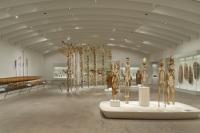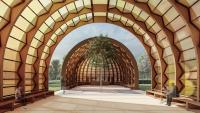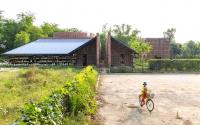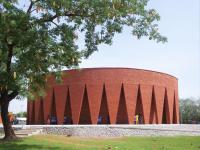The Rothschild Collection
Frankfurt / Main, Germany
The Goldkammer is one of the most modern museums in Europe and the Rothschild Room is the final space to visit in the exhibition. The walls of the 64 sqm space are completely covered with two-way mirrors. On three sides the walls are equipped with high-resolution LED-screens, installed behind the glass layers. The unique Rothschild Collection of 300 bullions from 35 countries with a total weight of 230 kg is presented in 38 vitrines which are integrated in the fourth wall.
The Lighting for the Room
Due to the mirrored walls, guests can have the immersive experience of being right in the center of the media presentation. Matt black ceiling panels and a dark floor are ideal backgrounds for the dynamic content of the LED-screens, displaying themes concerning gold, gold reserves, mining, etc.. The Rothschild Room can be also rented for events such as conferences or dinners, with a maximum capacity of 40 people. In the light of the parameters described above, all lighting should come out as discreet as possible. Two minimal, glare-reduced systems for two different tasks have been selected: very slim LED-lines have been placed slightly recessed in the gaps of the ceiling. They are equipped with custom-made louvers and serve as dimmable, gentle ambient lighting elements - without interfering the visitor's attention for the collection or the media presentation. The second lighting system, a special layout of modified, recessed Mini-LED-Down-ights serves for special occasions and - with predefined, dimmable punctual scenarios - for seminars and various arrangements of banquet - as well as meeting tables.
The Illumination of the Collection
A sandwich made of 19 mm armored glass and two-way mirrors have been used over the total room height, creating a great visual challenge for the lighting designers. High luminance levels have been applied to manage the thickness and absorption of the glass layers. Various tests and mock-ups had to be conducted in order to elaborate the lighting typologies. The lighting designers presented a choice of materials, colors and lighting typologies appropriate for the presentation of the collection. Concerning material and light, the following final decisions have been made:
- Spatial Light
"Spatial Light" is the lighting created by the backlit side walls in each vitrine. Evenly distributed light illuminates each vitrine from four sides, using flat LED-panels, covered with a layer of red silk. These panels create a magical atmosphere and soft ambient lighting in the vitrines, generating a high-level visual comfort for both the single vitrine as well as the entire collection (Silk Light). A warm-white color temperature (3.000°K) enhances the chromaticity of both the silk and the gold. For better contrast and optimal legibility of the objects, the designers skipped the option of a backlit back panel. The outstanding quality of the "Spatial Light" is how it works with the unconscious perception level - it is nearly impossible to perceive the emitting source of the ambient lighting. Both the bottom as well as the "frame" (ceiling panel and two side panels) can be switched and dimmed separately.
- Object Light
"Object Light" is the "mise-en-scène" of the gold. Installed on all four sides of the vitrine, an invisibly integrated system of Mini-LED Spots illuminates the collections' pieces with warm-white light. The spots can be precisely adjusted and are equipped with lenses for various beam angles. The system runs with a fiber-optic technique, using one generator with only one LED-light source for each vitrine. Within each vitrine 12 to 28 "heads" (with two different beam angles, 5° and 10°) have been implemented for the effective illumination of the complex arrangements of lying or floating gold objects. The integration and the detailing of the fiber optical system was the basis for the planning of the vitrines and had been tested in 1:1 mock-ups. Attaching great importance to an undisturbed and highly comfortable visual experience, it was crucial to conceal all lighting elements and eliminate any sort of glare.
- Lighting Designers
- pfarré lighting design
- Location
- Goldkammer, Kettenhofweg 27, Frankfurt / Main, Germany
- Year
- 2019
- Client
- Degussa Goldhandel GmbH
- Team
- AS+P Albert Speer + Partner GmbH
- Spatial and Media Concept, Film Production
- Blackspace GmbH, Munich
















